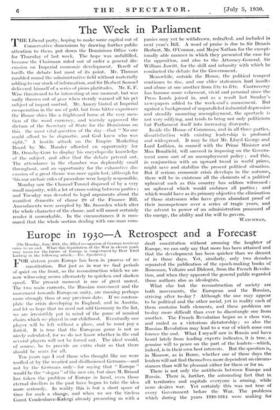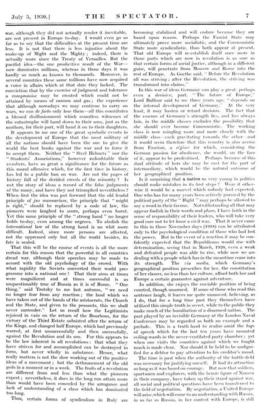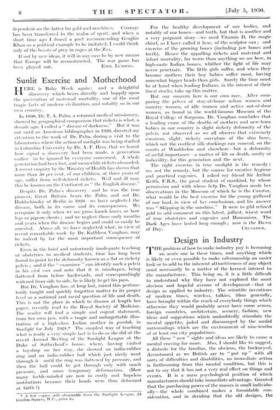Europe in 193o—A Re trospect and a Forecast
[On Monday. June 30th. the Allied occupation of German territory came to an end. What this liquidation of the War in eleven years may mean for the future of Europe is conjectured by Herr Emil Ludwig in rho following article.—Eu. Spectator.]
FOR sixteen years Europe has been in process of re- constitution. constitution. But just as in war we find periods of quiet on the front, so the reconstruction which we are now witnessing seems alternately to quicken and slacken speed. The present moment is one of great unrest. The two main currents, the Russian movement and the movement towards European unity, are running perhaps more strongly than at any previous date. If we contem- plate the crisis developing in England, and in Austria, and let us hope that we need not add Germany to the list, we arc irresistibly put in mind of the game of musical chairs which we played in our childhood. Eventually one player will be left without a place, and he must pay a forfeit. It is true that the European game is not so nicely calculated, for we do not know whether in the end several players will not be forced out. The ideal would, of course, be to mivide an extra chair so that there should be scats for all.
Ten years ago I and those who thought like me were Scoffed at by the wearied and disillusioned Germans—and not by the Germans only—for saying that " Europe would be the "slogan " oft he new era, but since M. Briand has taken the problem of Europe in hand, even those eternal dwellers in the past have begun to take the idea more seriously. In reality this is but a short space of time for such a change, and when we see the tireless Count Coudenhove-Kalergi already presenting us with a draft constitution without arousing the laughter of Europe, we can only say that more has been attained and that the development has been quicker than we dreamt of in those days. Yet, similarly, only two decades separated the publication of the epoch-making books of Rousseau, Voltaire and Diderot, from the French Revolu- tion, and when they appeared the general public regarded those authors also as ideologists.
What else but the reconstruction of society are both movements, the European and the Russian, striving after to-day ? Although the one may appear to be political and the other social, yet in reality each of them contains both elements, and these problems are to-day more difficult than ever to disentangle one from another. The French Revolution began as a class war, and ended as a victorious dictatorship ; so also the Russian Revolution may lead to a war of which none can foresee the end. What I myself saw in Russia and have heard lately from leading experts indicates, it is true, a genuine will to peace on the part of the leaders—which, indeed, is in their own best interests. But the question is, in Moscow, as in Rome, whether one of these days the leaders will not find themselves more dependent on circum- stances than will be pleasant either for them or for us.
There is not only the antithesis between Europe and Russia. There is, further, the astounding fact that in all territories and capitals everyone is arming, while none desires war. Yet certainly this was not true of every Government before the War. The problems which during the years 1910-1914 were making for war, although they did not actually render it .inevitable, are not present in Europe to-day. I would even go so far as to say that the difficulties at the present time are less. It is not that there is less injustice about the make-up of Might and the Mighty ; indeed, there is actually more since the Treaty of Versailles. But the pacifist idea—the one produttive result of the War— now dominates millions, whereas in those days it was hardly so much as known to thousands. Moreover, in several countries these same millions have now acquired a voice in affairs which at that date they lacked. The conviction that by the exercise of judgment and tolerance a compromise may be created which could not be attained by means of cannon and gas ; the experience that although nowadays we may continue to carry on wars, we can de facto only lose them—all this constitutes a blessed disillusionment which countless witnesses of the catastrophe will hand down to their sons, just as the mothers, for their part, will hand it on to their daughters.
It appears to me one of the great symbolic events in the development of Europe that the most military of all the nations should have been the one to give the world the best books against the war and to force it to accept them. Neither the " Steel Helmets " nor the " Students' Associations," however redoubtable their numbers, have as great a significance for the future as this moral offensive which, for the first time in history, has led to a public ban on war. Arc not the pages of history full of the derided creeds of the minority ? Is not the story of ideas a record of the false judgments of the many, and have they not triumphed nevertheless ? When first the idea was put forward that the old feudal principle of jus manuarium, the principle that " might is right," should be replaced by a code of law, the pioneers were laughed to scorn, perhaps even burnt. Yet this same principle of the " strong hand " no longer holds to-day, even among the negroes. To abolish the international law of the strong hand is no whit more difficult. Indeed, since more persons are affected, not the oppressed only but all the world besides, its fate is sealed.
That this will be the course of events is all the more certain for this reason that the powerful in all countries dread war, although their speeches may be made to accord with the old psychology of the crowd. With what rapidity the Soviets converted their world pro- gramme into a national one I That their aims at times were magnificent and at times successful is as unquestionably true of Russia as it is of Rome. " One thing," said Trotzky to me last autumn, " we need no longer fear from any reaction ; the land which we have taken out of the hands of the aristocrats, the Church and the State, and given to the peasants, this we shall never surrender." Let us recall how the Legitimists rejoiced in vain on the return of the Bourbons, for the victory of the Third Estate subsisted after the return of the Kings, and changed half Europe, which had previously warred, at first unsuccessfully and then successfully, against the Revolution and its son. For this appears to be the law inherent in all revolutions : that what they have striven for and accomplished can be destroyed in form, but never wholly in substance. Hence, what really matters is not the slow working out of the positive ideas of a movement ; but the dethronement of the old gods in a moment or in a week. The fruits of a revolution are different from and less than what the pioneers expect ; nevertheless, it does in the long run attain more than would have been conceded by the arrogance and lack of understanding of a class which has dominated too long.
Thus, certain forms of syndicalism in Italy are becoming stabilized and will endure because they are based upon reason. Perhaps the Fascist State may ultimately prove more socialistic, and the communistic) State more syndicalistic, than both appear at present. That old Europe will re-establish itself once more in those parts which are now in revolution is as sure as that certain forms of social justice, although in a different guise, will penetrate from Moscow and Rome into the rest of Europe. As Goethe said, " Before the Revolution all was striving ; after the Revolution, the striving was transformed into claims."
In this war of ideas Germany can play a great, perhaps even a decisive, part. " The future of Europe," Lord Balfour said to me three years ago, " depends on the internal development of Germany.- At the very least, it may hasten or retard decision. The fact that the essence of Germany's strength lies, and has always lain, in the middle classes excludes the possibility that she should ever become Communistic. The working class is now mingling more and more closely with the middle class—each gravitating towards the other —and it would seem therefore that this country is also averse from Fascism, a regime for which, considering the Germans passion for obedience, she would, on the face of it, appear to be predestined. Perhaps because of this dual attitude of hers she may be east for the part or intermediary, which would be the natural outcome or her geographical position.
Is it surprising that a nation so very young in politics should make mistakes in its first steps ? Were it other- wise it would be a marvel which nobody had expected. One who has for many years been actively pursued by the political party of the " Right " may perhaps be allowed to say a word in their favour. Notwithstanding all that may appear foolish in their words and plans, I have faith in the sense of responsibility of their leaders, who will take very good care not to let loose a civil war. That it never came to this in those November days (1918) can be attributed only to the psychological condition of those who had lost the power. But in the event of a reactions it may be con- fidently expected that the Republicans would rise with determination, seeing that its March, 1920, even a weak and defeated people was able to rise, while now we are dealing with a people which has in the meantime come into its strength. The via media, which Germany's geographical position prescribes for her, the constitutions of her classes, no less than her culture, afford both her and Europe a certain guarantee against adventure.
In addition, she enjoys the enviable position of being courted, though unarmed. If some of those who read this sentence laugh, it leaves me quite unmoved, believing, as I do, that for a long time past they themselves have utilized this simple truth in secret, while to the public they Make much of the humiliation of a disarmed nation. The part played by an invisible Germany at the London Naval Conference may be regarded as both an example and a prelude. This is a truth hard to realize amid the fogs of speech which for the last ten years have mounted ceiling-wards in the never-ventilated party chamber ; yet when one visits the countries against which we fought much is made clear. Nor should it be held to be undigni- fied for a debtor to pay attention to his creditor's mood.
The time is past when the authority of the battle-field was necessary for justifying oneself. It had its attraction so long as it was based on courage. But now that soldiers, sportsmen and explorers, with the heroic figure of Nansens in their company, have taken up their stand against war, all social and political questions have been transferred to the field of negotiation. By negotiation, a United Europe will arise,which will come to an understanding with Russia, in so far as Russia, in her contest with Europe, is still dependent on the latter for gold and machines. Courage has been transferred to the realm of sport, and when a short time ago I found a poet recommending Genghis Khan as a political example to be imitated, I could think only of the beasts of prey in cages at the Zoo.
If not by new ideas, it will in any case be by new means that Europe will be reconstructed. The war game has












































 Previous page
Previous page